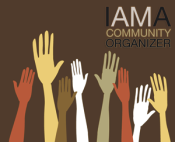Monday, 14 April 2008
Bearing the Evidentiary Burden of "Racism"
It is easier to prove the behavior instead of proving what a person is. So, how do you change the approach. It starts with us.
When we are aggrieved, instead of alleging what people "are" (which makes it hard or impossible for us to prove our case) we should state clearly what they have done and the evidence that it was color-aroused. (This is a basic tenet of therapy anyway, right? State the behavior instead of calling people names?)
We should always limit ourselves to alleging specific instances of color-aroused antagonistic behavior, NOT "racism" or that someone is a "racist." That alone will make us more credible in the media and with our patients and colleagues, because we will not be making charges that are basically impossible to prove. Instead we will be making assertions the proof of which is already in the record (e.g. co-worker has repeatedly called people the "N" word during work hours".
When we say that we are fighting "racism" it makes it seem as if individual acts of color-aroused antagonism do not, in and of themselves, rise to a level that requires remediation. Some of us believe that, in addition to proving that the person engaged in acts of color-aroused antagonism, we have to make the case that these acts prove that the person is a "racist" or we have to convince others that these acts constitute "racism".
Many white people and the media agree that acts of color-aroused antagonism are unacceptable and ought not be repeated, but they will not join us in labeling someone who engages in those acts "racist".
We need to realize that it is not necessary for someone to be a "racist" in order for them to need retraining or dismissal from a job. It is sufficient that they have engaged in one or more acts of color-aroused antagonism, because that alone is something that most people abhor, at least publicly, because we all understand how destructive, provocative and inflammatory it is.
White people will never agree that most whites are "racist". But they might agree, based on evidence, that most whites have engaged in acts of color-aroused antagonism or disparate treatment. Those are the acts that Black people are angry about, and that are destructive to the fabric of society, whether or not they were "racist" acts committed by "racists."
Here's an example: Recently surrogates for the Clintons defended the Clintons against charges of racist behavior by saying that, "the Clintons are not racists." A lot of people agreed with that assertion, but does that really address the question at hand? What difference does that make whether the Clintons are "racists" if everyone agrees that the Clintons are engaging in identifiable acts of color-associated antagonism?
We Blacks are responsible for charges of "racism" and so we Blacks are responsible for having set the evidentiary bar so high that our case becomes impossible to prove. The change has to start with us.
When we are aggrieved, instead of alleging what people "are" (which makes it hard or impossible for us to prove our case) we should state clearly what they have done and the evidence that it was color-aroused. (This is a basic tenet of therapy anyway, right? State the behavior instead of calling people names?)
We should always limit ourselves to alleging specific instances of color-aroused antagonistic behavior, NOT "racism" or that someone is a "racist." That alone will make us more credible in the media and with our patients and colleagues, because we will not be making charges that are basically impossible to prove. Instead we will be making assertions the proof of which is already in the record (e.g. co-worker has repeatedly called people the "N" word during work hours".
When we say that we are fighting "racism" it makes it seem as if individual acts of color-aroused antagonism do not, in and of themselves, rise to a level that requires remediation. Some of us believe that, in addition to proving that the person engaged in acts of color-aroused antagonism, we have to make the case that these acts prove that the person is a "racist" or we have to convince others that these acts constitute "racism".
Many white people and the media agree that acts of color-aroused antagonism are unacceptable and ought not be repeated, but they will not join us in labeling someone who engages in those acts "racist".
We need to realize that it is not necessary for someone to be a "racist" in order for them to need retraining or dismissal from a job. It is sufficient that they have engaged in one or more acts of color-aroused antagonism, because that alone is something that most people abhor, at least publicly, because we all understand how destructive, provocative and inflammatory it is.
White people will never agree that most whites are "racist". But they might agree, based on evidence, that most whites have engaged in acts of color-aroused antagonism or disparate treatment. Those are the acts that Black people are angry about, and that are destructive to the fabric of society, whether or not they were "racist" acts committed by "racists."
Here's an example: Recently surrogates for the Clintons defended the Clintons against charges of racist behavior by saying that, "the Clintons are not racists." A lot of people agreed with that assertion, but does that really address the question at hand? What difference does that make whether the Clintons are "racists" if everyone agrees that the Clintons are engaging in identifiable acts of color-associated antagonism?
We Blacks are responsible for charges of "racism" and so we Blacks are responsible for having set the evidentiary bar so high that our case becomes impossible to prove. The change has to start with us.
Subscribe to:
Post Comments (Atom)



No comments:
Post a Comment